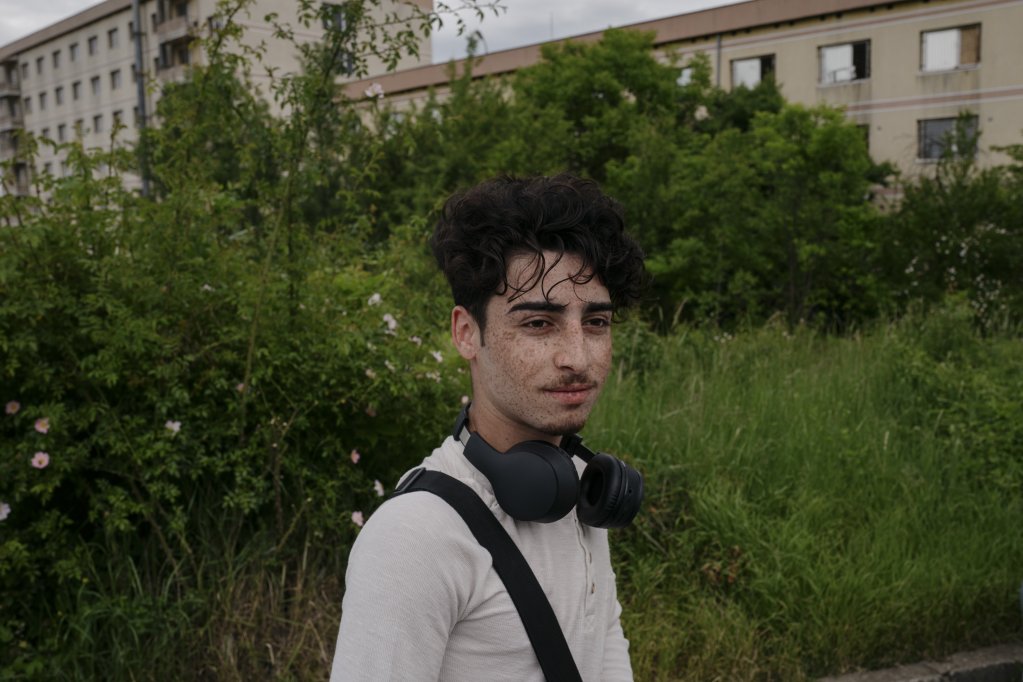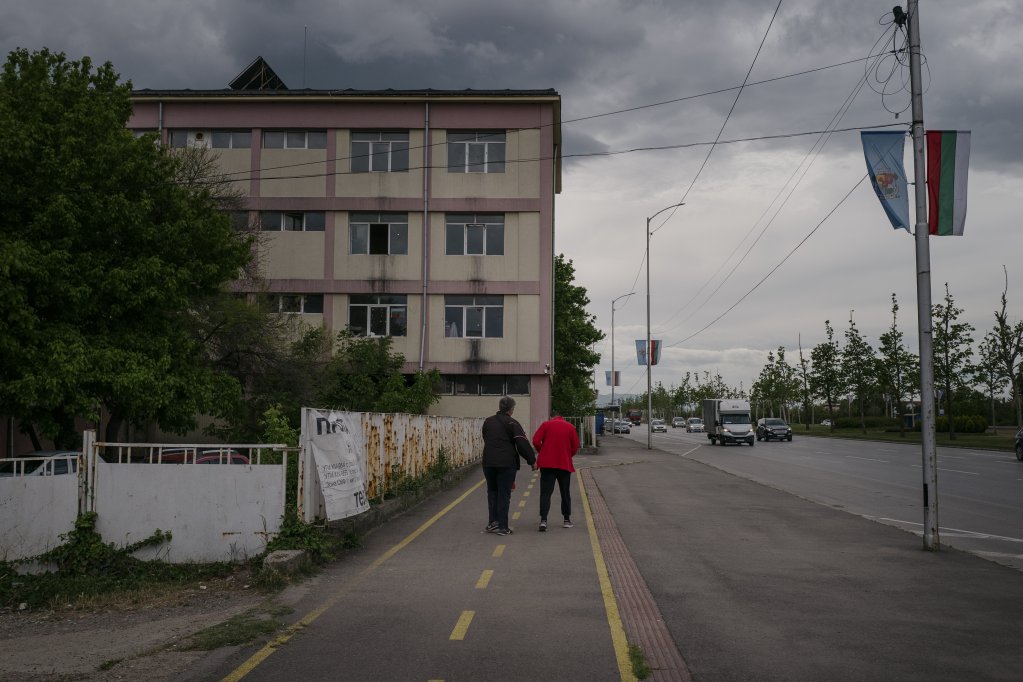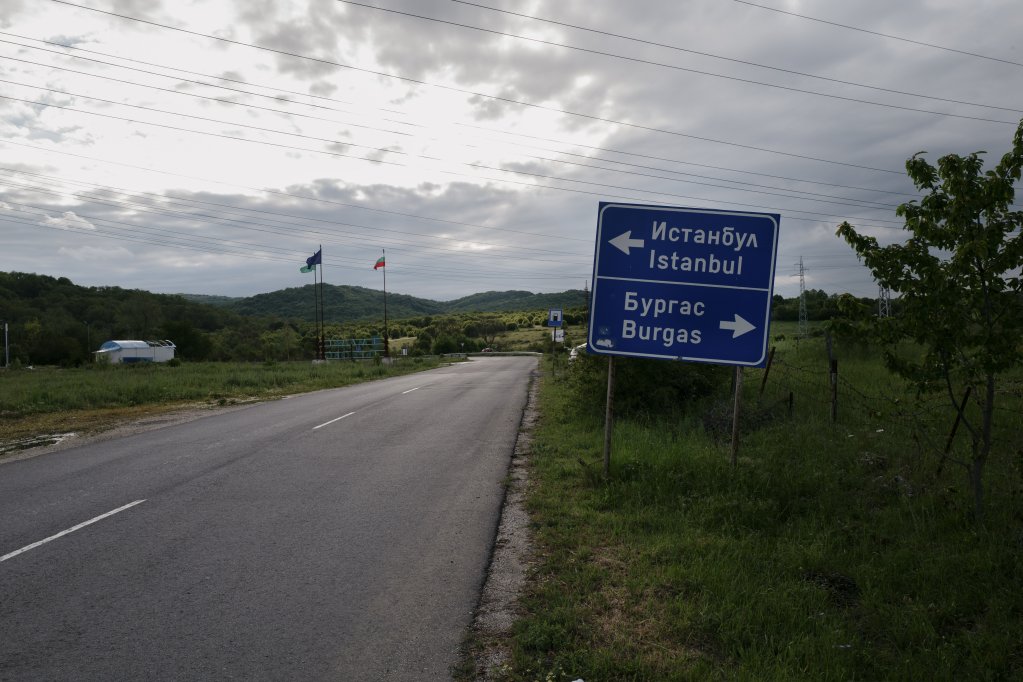Syrians who arrive in Europe by crossing the Turkish-Bulgarian border have seen their asylum applications "systematically rejected" by Bulgaria. The EU country has rejected nearly all asylum claims from these nationals since the fall of Bashar al-Assad, putting them in limbo.
Mohamed put on a pair of black headphones as soon as he closed the metal gate of the Ovcha Kupel reception center and stepped out into the suburbs of Sofia. He started walking to the rhythm of the music, looking serene. Freckles cover his face, framing his large, dark eyes.
The 18-year-old crossed the Turkish-Bulgarian border to reach Bulgaria after fleeing Syria and leaving school two years ago. "It was very difficult," he said, folding his hands over the black bag slung over his shoulder. "The road was very long. I walked through thorns. It was cold. I even saw a bear!"
Read AlsoThree minors die at Bulgaria's border as activists accuse authorities of blocking rescue
Mohamed is now thinking about backtracking, despite the difficulties he faced getting into Europe. He has been waiting for months in the Bulgarian reception center with other young people. His asylum application was recently rejected a second time. "I have nothing left and no right to reside here,” he said. At least in Turkey, "I have my little brother and my cousins".

Further up the road, Mohamed met Issa and Bashar, two friends who are also from Syria. The Ovcha Kupel center "only houses Syrians", said the three teenagers in unison. An antiquated children’s slide outside the center has been invaded by weeds, while several of the building's broken windows let the cold air of the Bulgarian spring inside.
Most asylum appeals rejected
Bashar lives in the Vrazhdebna center which is located along the highway that leaves the capital. Three police officers dressed in dark uniforms and seated in a narrow glass booth monitored the comings and goings of the center. There are "only Syrians" here as well, said Bashar. Clothing hung from the bars of the windows of the building, which was painted pink with rusty hues. Some items had fallen and become entangled in the tree branches below.
Bashar has already tried escaping the place. Once he entered Europe, he sought to reach Austria. Yet like all migrants who were intercepted upon entering Bulgaria, he was fingerprinted on the fringes of the European Union. In Austria, the authorities, following the Dublin Regulation [which requires the country where an asylum seeker first enters Europe to process his or her application, editor’s note], sent Bashar back to Bulgaria.
After spending several months waiting in Vrazhdebna, he learned that his asylum application was finally rejected. According to Bulgarian law, the first asylum application takes a maximum of six months to be processed, after which it’s possible to make only one appeal. "There is no more help now, nothing left. They don't let us work and we won’t have the right to live here," said Bashar with a deep sigh. He is suffering from a skin infection, visible on his face because of the insalubrious conditions of the center, which he describes as "filthy with infested sheets and sicknesses”.
Read AlsoUK: Syrian asylum seekers contesting deportation to Bulgaria
Syrian asylum applications have been "systematically rejected" since the fall of Bashar al-Assad on December 8, 2024, said Diana Radoslavova, a lawyer of the Centre for Legal Aid -- Voice in Bulgaria. "There have been hundreds of legal appeals in recent months, but most decisions, including those from the Supreme Court, uphold the asylum rejections".
'No country says Syria is safe, except here!'
The United Nations High Commissioner for Refugees made the same observation in its March 2025 report on Bulgaria: "Regarding claims of applicants from Syria, in addition to those refused on the grounds of Turkey constituting a safe third country, [Bulgaria’s state agency for refugees] SAR started in the last quarter of 2024 issuing rejections of applications on the merits”.
The Bulgarian administration believes that the situation in Syria no longer corresponds "to a situation where the indiscriminate violence reaches such a high level that the civilians, solely on account of their presence on the territory of that country or particular region, would face a real risk of being subject to that threat."
In other words, the Bulgarian authorities consider that Syrian applicants, with some exceptions, no longer fall within the grounds for persecution defined by the 1951 Geneva Convention. The asylum refusals thus keep coming one after another.
'We have no more house and no job'
After crossing the border in August 2023, Mohamed Al-Hussein managed to obtain asylum in February 2024 before the major shift in asylum policy. The 23-year-old has a tattoo written in Arabic in homage to his mother, who is in Turkey: “I can’t love anyone more than you”. He who had dreamt of settling in Germany ended up in Bulgaria, also because of the Dublin Regulation, and was granted subsidiary protection.
Like so many others, Mohamed can't imagine returning to Syria. "We don't have a house anymore; it was destroyed. I don't have a job there. I have a brother who works there for 7 US dollars a day, what do you want to do with that? Assad is gone, but everything is still the same. There's no electricity, no water. It’s going to take years before everything is rebuilt."
Yet he knows very well that the Bulgarian authorities don't see the situation in the same light. "When the regime fell, they simply rejected everyone; they stopped giving them papers. I have a lot of friends still in the camp, even minors, who were rejected." When his friends ask for an explanation for their rejections, the authorities tell them, “Syria is safe," repeated Mohamed mockingly. "No country says Syria is safe, except here!"
A 70 percent rejection rate in 2025
The statistics are telling: from January 1 to April 30, 2025, Bulgaria rejected 1,292 asylum requests out of the total of 1,834 that were filed, according to SAR, resulting in a 70 percent rejection rate.
The figure represents a steep increase compared to 2024, when the rejection rate was 19 percent. The rejection rate had already begun increasing in previous years, even before the fall of Bashar al-Assad. “Starting from mid-2024, the SAR initiated individual assessment of Syrian applications”, reported the Bulgarian Helsinki Committee, a European human rights NGO. This new doctrine resulted in almost automatic rejections in the last quarter of the year.
"SAR began rejecting all new Syrian asylum seekers in October 2024. There have been very specific exceptions, but overall, it's been a major transformation, despite Syrians still being the main applicants for international protection," said Radoslavova.

Prior to the watershed moment, Syrians were the only nationals truly protected in Bulgaria. All the others – Afghans, Iraqis, Pakistanis, Moroccans – long had a rejection rate of around 90 percent. Syrians are now approaching the same high rejection rates.
Contacted by InfoMigrants, the Bulgarian state agency for refugees has not at present responded to our questions.
'I can't do anything, and neither can my children without a Bulgarian residence permit'
"We've been in Bulgaria for 11 months, but we have no rights, no papers, nothing at all," said Zahida, who was sitting in a public park not far from the Harmanli shelter in southern Bulgaria. The young Kurdish woman, originally from Aleppo, had a tired face. She and her husband fled the civil war ravaging Syria in 2013 and found refuge on the other side of the border, in Gaziantep, Turkey, for nine years. Her first two children, Mohamed, 9, and Laila, 6, were born there.
"We experienced racism and anti-Kurdish attacks, so we chose to leave Gaziantep and head for Europe," said Zahida. While she was 8 months pregnant, Zahida, her husband, and their two children traveled to Istanbul. They continued to the city of Edirne and managed to cross the Turkish-Bulgarian border in June 2024 with much difficulty. "We didn't want to stay in Bulgaria. We were planning to continue our journey and reach France, where we have some friends," she said. "But the Bulgarian police arrested us just after we crossed the border."
For migrants crossing the border on foot, it is difficult to avoid being intercepted by the Bulgarian police. After spending a few hours at the police station for initial registration, they are systematically taken to one of the country's two closed centers: Lyubimets (near the Turkish border) or Busmantsi (in Sofia). Both centers are dedicated to the detention of foreigners, where living conditions are often described as undignified.
Read AlsoMigrants deprived of their 'fundamental human rights' in Bulgarian detention centers
Those who declare themselves asylum seekers are released after about ten days. Forced to apply for asylum to end her detention, Zahida learned that her application was rejected on February 7, 2025, two months to the day after the fall of Bashar al-Assad's regime. Her husband's application was rejected a few weeks later. “With their refusal, the Bulgarian authorities are indicating that Syria is now a safe country," said the young woman.
"Without a residence permit in Bulgaria, not only can I do nothing, but neither can my children. For example, they can't go to school," said Zahida. She has family in Canada and has tried to contact the authorities there. But the country has no diplomatic representation in Bulgaria. "I'm tired, I've lost everything," she said. "All I want is to leave Bulgaria. I'm thinking about my children and their future, their education: we can't stay in this situation."
Syrians pressured into voluntarily returning
Syrians or not, most migrants know very well that they have little chance of gaining protection and only consider Bulgaria as a transit country. The figures speak for themselves: 8,090 decisions on asylum applications were made in 2024. Almost as many cases were closed: 7,301. These applicants continued their journey through the EU and are considered "on the run." Many Syrians who filed for asylum in Bulgaria, under the Dublin Regulations, left the country without waiting for a response.
Yet because of the Dublin legislation, many European countries send migrants back to Bulgaria where they find themselves back to square one, like in Bashar's case. Many end up in detention, then in a reception center, from where they restart the asylum application process... and find themselves rejected. A dead end. "Many people become homeless. They are completely in limbo," said Radoslavova.

For those like Zahida whose asylum application was definitively rejected, the risk of being stopped by police and being placed in a closed detention center is high. Some migrants remain stuck in the center for months, up to a maximum of 18 months, because of their irregular status in Bulgaria. Yet no forced deportation flights to Syria are currently being organized. People are being detained in the centers, “to put pressure on them to sign voluntary returns," said Radoslavova. "In consultation with Frontex, these voluntary returns offer a reintegration package."
Read AlsoHow do UN Migration's voluntary returns work?
No Name Kitchen (NNK), a humanitarian organization working with refugees in the Balkans, published a December 2024 report on how Bulgarian authorities have been attempting to force Syrian asylum seekers out of the country since the ousting of al-Assad. Some 200 Syrians at the Harmanli center were individually interviewed and pressured into signing voluntary return documents on December 13. "My friend came out and said they beat him to force him into the room,” reported one asylum seeker. Another person said, “[they] beat up two elderly people in front of my eyes”, in a witness account that was cross-checked by the Guardian. The SAR denied these accusations, citing a simple "initiative by [the agency’s] social experts” to “assess the intentions of the Syrian asylum applicants”.
The situation in Bulgaria is symptomatic of the wider European context. Some countries, including France, have suspended their processing of Syrian asylum applications. Others, like Austria, have moved toward ending protection by developing a "repatriation and expulsion" program. The central European country has promoted a 1,000 euros "return bonus" starting in mid-December 2024. "The fall of the Assad regime has provided a pretext for EU states to obscure hostile migration policies," said Esme Smithson Swain, NNK’s violence reporting coordinator, in an interview with the Guardian. "The EU must recognise that the fall of a dictator does not erase decades of conflict.” Following the NNK report, Syrians and their lawyers in the UK condemned Dublin returns to Bulgaria.
Housed in the Vrazhdebna center like Bashar, Haitham still hopes to find a way out of this Bulgarian dead end. This young, slender Syrian dusts off his clothes with long, tired gestures. He’s tired of not being able to wear clean clothes and pulls up one pant leg to reveal an infected wound. "We have to get out of this horrible situation. Will I be able to go to France, Italy, or Germany? I want to study," he says again and again. A few hours later, Haitham was in the center of Sofia. Amid the bright lights of Iraqi and Syrian restaurants, the young man's eyes had recovered their former spark. He simply had an appointment for a haircut for now, and after that, he planned on treating himself to "one of the best kebabs in the neighborhood".
This report was produced with the support of JournalismFund Europe.
